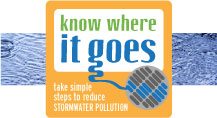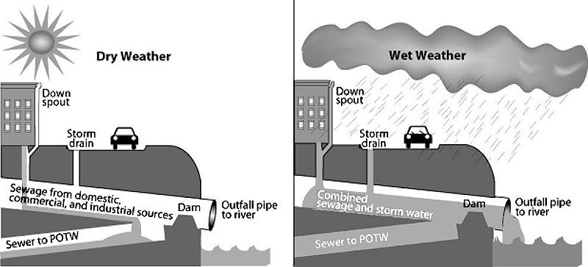The Rhode Island Department of Transportation (RIDOT) has taken a leadership role in achieving sustainable solutions to manage stormwater through a unique statewide outreach and education initiative.
Stormwater Solutions Initiative
The “Stormwater Solutions” initiative, funded by RIDOT with a grant from the Federal Highway Administration, supports implementation of the new state-level stormwater regulations as well as RIDOT’s ongoing compliance with the federal Municipal Separate Storm Sewer Systems (MS4) program.

The purpose of Stormwater Solutions is to:
- conduct a statewide campaign to raise public awareness of the stormwater problem and actions individuals can take to prevent stormwater pollution;
- develop consistent educational materials and outreach methods that municipalities, state agencies, and community organizations can use to empower citizens, businesses, and builders to solve local stormwater problems;
- provide model ordinances for local stormwater management with related training; and
- train government staff, local officials, and others in updated stormwater management practices.
State regulations call for incorporating Low Impact Development (LID) as the “industry standard” for development. LID is an approach to land development that works with nature to manage stormwater that runs off impervious surfaces as close to its source as possible and treats it as a resource rather than a waste product. It reduces the impact of built areas and promotes natural movement of water within an ecosystem.
By proactively integrating LID and sustainable practices into a comprehensive outreach and education program, the Stormwater Solutions initiative is finding sustainable ways to protect the environment, save money, achieve regulatory goals, and build public support for sustainable transportation infrastructure.
The initiative is being implemented in partnership with Rhode Island Department of Environmental Management (RIDEM); the University of Rhode Island (URI) Cooperative Extension’s Nonpoint Education for Municipal Officials program; and the Southern Rhode Island Conservation District. As part of the initiative, a team of professionals from these organizations is developing materials to educate and inform towns, cities, and the general public across the state about compliance with the new stormwater regulations.
Training Programs to Prevent Runoff
Through the Stormwater Solutions outreach effort, more than two dozen training workshops for RIDOT and municipal employees have been completed. The training has addressed new ways to prevent runoff pollution at public works garages and construction sites; the inclusion of improved pollution controls in new project designs, construction practice, and routine maintenance; and designing for “green streets“ and ways communities can make a difference in preventing stormwater pollution.
RIDOT is also integrating LID techniques in new project designs. An early example of this integration is the reconstruction of Route 138 in South Kingstown. LID techniques will convey stormwater away from the road through grassed swales instead of standard piping and inlets, saving construction costs, improving water quality, and enhancing the road’s appearance. The project also includes a landscaped bio-retention feature in a roundabout to provide water quality treatment and to infiltrate stormwater into the ground.
Community Outreach
Stormwater Solutions is working to reduce impacts to stormwater at the source by conducting community outreach to educate the public and municipal officials on the importance of pollution prevention and applying environmentally sustainable and cost saving LID techniques. These source reduction activities – which include everyday actions such as reduced use of fertilizer, litter control, hazardous material control, and use of ground infiltration and bio-swales to filter pollutants – reduce the need to build and maintain expensive treatment structures and provide opportunities for creating greener, more visually attractive landscapes along roadsides.
Stormwater Solutions offers easy-to-use materials for public education and outreach to inform communities about ways they can help manage stormwater runoff. The materials – which are publicly available on a website – are designed for use by municipalities, stormwater managers, watershed organizations, or interested civic groups.

Illustration of Combined Sewer Overflow from Stormwater Fact Sheet: Source: http://ristormwatersolutions.org/docs/1.Intro.ResFactSheet.pdf.
For example, the website provides a series of fact sheets on various aspects of stormwater management:
- Where Does It Come From, Where Does It Go?
- Where Do I Fit In?
- What Do You Do With Household Chemicals?
- How Healthy Is Your Septic System?
- Is Your Lawn Care Stormwater-Friendly?
- Is Your Yard A Sponge?
- Do You Scoop the Poop?
- Making Auto Care Stormwater-Friendly
- Involving Your Neighbors in Storm Drain Marking
- Promoting Stormwater-Friendly Yard Care in Your Neighborhood
- Promoting Responsible Pet Waste Disposal in Your Neighborhood
- Involving Local Businesses in Stormwater Management
A variety of other outreach materials also are provided, including cartoons, articles, display materials, radio spots, videos, and stormwater training manuals. The website also provides a variety of strategies, examples from towns in the state, and an inventory of LID practices such as bio-swales, green roofs, cisterns, permeable pavement, rain gardens, and site design.
Next Steps
Allison Hamel, Environmental Scientist/Stormwater Program Coordinator with RIDOT, said the agency is working with DEM and URI to develop a second five-year agreement for public education and outreach. The second agreement will focus on:
- training in use of a new Erosion & Sedimentation Control Handbook (currently under revision) for a variety of audiences, particularly field inspectors;
- exploring greater focus on hands-on training to actively assist MS4s in managing local storm drain systems;
- customizing assistance to meet local needs based on stormwater managers existing resources and their priorities;
- targeting training/workshops/workgroups on priority areas such as high quality Special Resource Protection Waters (SRPWs) and restoration of impaired waters with total maximum daily loads (TMDLs); and
- state and local permitting issues and implementation of the RI Stormwater Design and Installation Standards Manual, with emphasis on implementing LID at the local level and permitting in priority areas such as high quality SRPWs and restoration of impaired waters with TMDLs.
Transferability and Lessons Learned
Hamel said other state DOTs could benefit from efforts similar to the Stormwater Solutions program.
“We think that this would most definitely be transferable to other DOTs, particularly in other states where the DOT is the only state-wide MS4,” she said.
“Not only did RIDOT receive full compliance ‘credit’ for Minimum Measure 1 & 2 (except for the public notice part) from the state regulatory agency (RIDEM), RIDOT staff received personalized training that we would not have received otherwise (i.e. the linear LID training),” she added.
Hamel also stressed the importance of training. “One of our greatest lessons learned was that the ‘train the trainer’ workshops provided great resources, but those resources were rarely used and implemented once the ‘trainer’ got back to work.”
“This is one of the reasons why we are focusing on the hands-on training in the second agreement,” she said.
Hamel also noted the importance of training not only for staff, but also for upper-level management, that is, “those with decision-making capabilities and money-wielding powers.”
“It is important that managers and the directors recognize the money and assets and resources that stormwater management truly needs,” she added.
More information is available on the Stormwater Solutions website, at http://ristormwatersolutions.org/ and by contacting RIDOT’s Allison Hamel at [email protected].